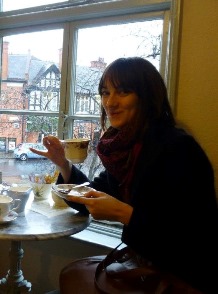Maria-Anna
- MA in History of Art (full-time)
- MA student representative
What are your research interests / what are you working on?
"Most broadly, I am interested in architecture, materiality and art in the Early Modern period. For my Masters dissertation, I am focussing on Elizabethan ornament, in an attempt to approach some of the fantastic visual oddities of the architecture of this period with a more theoretical viewpoint. I am fascinated by the intersections of art (in the broadest sense), power, identity and resistance; and the power of the visual medium to make its own meanings."
What modules have been most fascinating and why?
"My autumn term modules of Early Modern Habsburg Women and Their Material Legacy and Interpreting Northern Renaissance Art pushed me very firmly towards the Early Modern period, and both were intensely challenging in inviting constant re-interpretation of how art and artefacts are cast by art-historical narratives. The former introduced me to a staggeringly rich variety of material, ranging from clothes through monastic foundations to festival publications, while the latter really pushed me to find new ways of thinking in a very saturated scholarly field."
What background do you come to HoA from and why HoA?
"I studied History of Art at undergraduate level, having gone into it with an equal interest in literature. I have never regretted the choice, however, as I think I have discovered that my imagination and enthusiasm are most enflamed by the visual medium."
Why York rather than somewhere else?
"I stayed here for my MA because I felt it was one of the very few places that offered flexibility in terms of subject matter, as I was still not quite sure what art-historical areas I was most interested in; I was also immensely in awe of the tutors, who had imperceptibly managed to completely overhaul my thinking during the course of my undergraduate degree."
Do you find there’s a strong group atmosphere among the students?
"The MA course is a fairly small group and I feel we have a really good rapport within it. The seminars, study trips and regular research seminars have really built this sense of camaraderie, and now that the taught part of the degree is over, we are continuously planning group activities to keep us sane through the dissertation-writing process."
What’s the level of support like from staff and the department as a whole, are they receptive to feedback?
"As a course representative, I have been in prime position to witness the attention given to student feedback in this department, not only in considering specific comments relayed by the cohort, but also more generally in always listening to the student perspective on wider questions and discussions."
What’s been your favourite study trip and why?
"Impossible to call, but all have exploited our tutors' unrivaled access to curators and resources I would never have had the chance to encounter otherwise."
What do you feel is the most important thing you will take away from your experience at York?
"A sense of the near-boundless richness of opportunity that art-historical enquiry offers, of the excitement of discovering my own passions and obsessions, and a confidence that the more a topic is pushed, the greater results – and rewards – it yields. I feel I have come full circle – back to trusting my intuitions, but now with the apparatus to make them count."
What would your dream job be?
"I hope to become a curator; V&A is currently at the top of the wish list."

